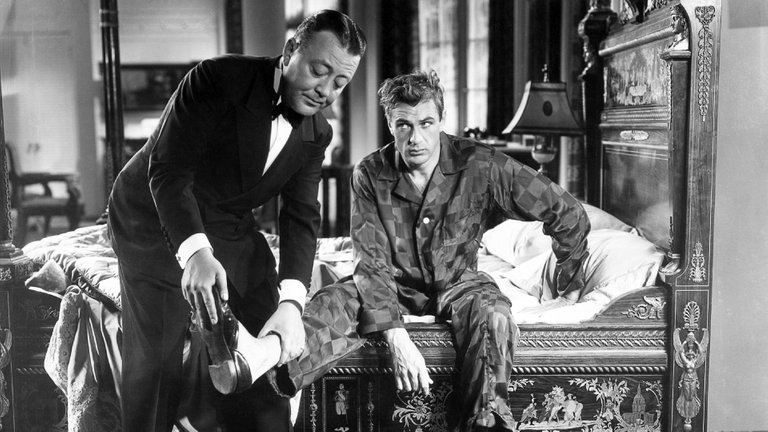Film Review: Mr. Deeds Goes to Town (1936)

People from rural areas of America represent a social group that is nowadays treated with almost genocidal disdain by Hollywood. Many decades ago, this was not the case, and Hollywood actually catered to that group by making films in which "yokels" were protagonists, representing everything that is good, noble, and pure. One of the most famous examples is Mr. Deeds Goes to Town, a 1936 comedy directed by Frank Capra.
The plot begins when tycoon Martin Semple dies in a car accident, leaving a $20 million estate to Longfellow Deeds (played by Gary Cooper), his estranged nephew who lives in the small town of Mandrake Falls, Vermont. He is tracked down by lawyers from the firm led by John Cedar (played by Douglass Dumbrille) and brought to New York City. Deeds, the owner of a small business, a tuba player, and a respected member of the local community, is reluctant to come to the big city where his lack of sophistication and "proper" manners get him into all sorts of trouble. Cedar and his colleagues want to obtain power of attorney, allegedly to help Deeds live a carefree life while they handle their clients' business, but their real intention is to cover their own misdeeds. Deeds' lack of sophistication is compensated by his common sense and lack of trust towards sycophantic people around him. It is an entirely different matter when he, seemingly by accident, meets the beautiful factory worker Mary Wilson (played by Jean Arthur). He starts dating her, unaware that she is actually Babe Bennett, a newspaper reporter tasked with covering his adventures in sensationalist articles. When Deeds announces that he would give away most of his wealth to impoverished farmers, Cedar tries to prevent it by petitioning the court to declare Deeds mentally incompetent.
The best-known films of Frank Capra are populist comedies, including Capra's previous Oscar-winning triumph It Happened One Night. Like Mr. Deeds, that film was written by Robert Riskin, Capra's most successful collaborator. Riskin, a leftist, tried to use the escapist medium of Hollywood comedy to remind the audience of some unpleasant truths about social and class divisions in America, which became acute during the Great Depression. Riskin championed the common man or "the little guy," and in Mr. Deeds, he found the embodiment of such an ideal in the protagonist coming from a simple but honest small town that maintained the values of community, unlike big cities with greedy lawyers, sensationalist press, or corrupt politicians. Riskin also used the opportunity to take a stab at the pretentious urban intelligentsia in a small but brilliant scene during which Deeds, described as an amateur poet, gets into conflict with arrogant, condescending elitist writers modelled after the real-life Algonquin Round Table.
The modern-day "Cinderella" story is directed with great ease by Capra, but the greatest asset of the film lies in the cast. Gary Cooper plays one of the most famous roles of his career and displays his laid-back style of acting, which seems perfect for the uncomplicated role of Everyman. Only later in the film, when the story is slightly complicated by the obligatory romantic subplot, does Cooper show his true acting skills. The role played by Jean Arthur was more demanding, and the actress was, according to her later claims, very insecure on set. However, it doesn't show much in the film, and the transformation of her character from a scoop-grabbing journalist into a woman who genuinely loves Deeds is quite good. Lionel Stander, a formidable character actor who was blacklisted during the McCarthy era, delivers another great performance as Cobb, a former journalist hired by Cedar to keep Deeds out of trouble and who convincingly portrays a cynic turning into Deeds' valuable ally.
Although Mr. Deeds Goes to Town is a comedy, the film takes a more serious turn in the second half. This shift occurs during an unpleasant scene in which Deeds encounters a desperate farmer driven to madness by the deprivations of the Great Depression. The transition towards drama is slightly abrupt, but Riskin and Capra succeed in entertaining the audience while reminding them of the sad realities that await them when they leave the theatre. Although Capra could have made the film tighter, Mr. Deeds Goes to Town represents one of the better parts of his filmography. It was a big hit and won Capra his second Oscar for Best Director. Capra wanted to repeat its success by filming a sequel titled Mr. Deeds Goes to Washington, which eventually became the separate film Mr. Smith Goes to Washington starring James Stewart. Many decades later, this film inspired the Coen Brothers for The Hudsucker Proxy, one of their best works. In 2002, it was remade as Mr. Deeds, a comedy starring Adam Sandler."
RATING: 7/10 (+++)
Blog in Croatian https://draxblog.com
Blog in English https://draxreview.wordpress.com/
Leofinance blog https://leofinance.io/@drax.leo
Unstoppable Domains: https://unstoppabledomains.com/?ref=3fc23fc42c1b417
Hiveonboard: https://hiveonboard.com?ref=drax
Bitcoin Lightning HIVE donations: https://v4v.app/v1/lnurlp/qrcode/drax
Rising Star game: https://www.risingstargame.com?referrer=drax
1Inch: https://1inch.exchange/#/r/0x83823d8CCB74F828148258BB4457642124b1328e
BTC donations: 1EWxiMiP6iiG9rger3NuUSd6HByaxQWafG
ETH donations: 0xB305F144323b99e6f8b1d66f5D7DE78B498C32A7

I love the introduction to this review, how very true. This is a great film it has been many years since I've seen it. It was my introduction to Gary Cooper and Capra. It is such a pity that in modern day Hollywood you would never get a film of this kind made. Never mind the fact that I don't know of any modern directors of the Capra mould.
I haven't seen that film in many years! Great review
Reviewed and approved for an Ecency boost